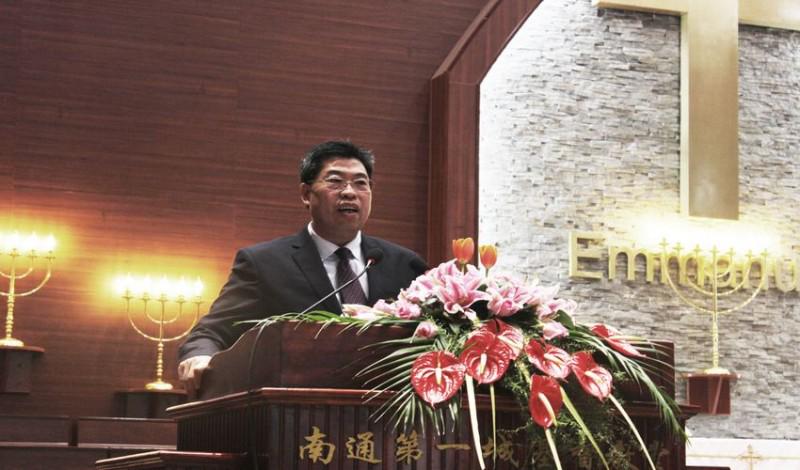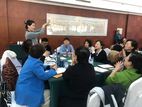"For the church in Jiangsu province, high-quality growth or quality-type church construction will be a long-term theme," said Rev. Zhang Keyun, chairman of the Jiangsu Three-Self Patriotic Movement and president of Jiangsu Theological Seminary in an interview with Gospel Times, a daily Chinese Christian news website.
As the church in Jiangsu has been progressing in building church buildings, theological construction, education, and charity since the opening up and reform, it should put more emphasis on "the construction of quality-type churches".
Having started in the church in Jiangsu, Rev. Zhang has served in the Jiangsu Christian Council & Three-Self Patriotic Movement (CC&TSPM) for 22 years.
The pastor grew up in a Christian family whose mother had a devout faith and was committed to attending church during the special time. Learning about the faith from his mother since his childhood, he started to preach sermons when he was in high school. His generation of Christians raised in those special years and dedicated themselves unconditionally to serve God, became the foundation and reflected the characteristics of church growth after 1978.
The direction of development of the church in Jiangsu: quality-type church construction
Rev. Zhang asked, "It is a good thing that the church has many members, but does the majority of the congregation know in whom they have believed?"
Most rural Christians converted to Christianity particularly because they had been healed of a disease. However, their faith would be utilitarian and superstitious if they stayed in that early status for a long time.
Rev. Zhang stated that a concept of "quality" should be established to change the mode of church growth and pastoral staff and core believers should be conscious of this.
Secondly, the clergy should have a high quality, strong spiritual life as well as relatively higher education and expertise.
In the past, the church lacked personnel in administering the basic church sacraments (baptism and Holy Communion) and delivering sermons. This should however improve because the system of developing talented personnel on different levels has been gradually formed in the provincial church.
For instance, the church in Jiangsu requires that all the local pastors be educated beyond high school and people without a bachelor's degree in theology cannot be ordained as pastors. An ordained pastor should serve in the church for three years after graduation from a seminary and publish an academic paper in a publication above provincial level.
In addition, Jiangsu Theological Seminary provides a relevant program to upgrade graduates with only an associate degree.
Rev. Zhang added that meanwhile, pastoring was more necessary than evangelism given that the number of believers was steadily increasing. More importantly, believers who were sharing the gospel were short of systematic pastoral training.
Moreover, healthy church development should cover the short and also the long term. Cultivating talent is the key. For example, the staff at the provincial-level of the CC&TSPM should include major leaders of the province's 13 cities and also more young people.
Thirdly, the churches should share resources with each other. The church in Jiangsu plans to coordinate resources. Under the principle that theological graduates are encouraged to return to their mother churches, they are allowed to work in local churches in need and are guaranteed a living wage. Meanwhile, it plans to give ten percent of the provincial theological education fund to support local training and pastoral workers with severe financial difficulties as well as encourage local churches to do as the same.
Fourthly, the church should develop a benign interaction with communities and society by showing concern for society and serving it through action. The church should be a platform to attract various gifted people. He said that owing to its limited resources, the church has followed society in the past four decades. The intent is to balance the gap during the period of the church's interaction with society.
Overall, the church has obviously "been on the margins" and has "disadvantages". However these features were changing in a positive way. The structure of church staff and the congregation were moving "upward", according to the pastor.
Twenty years ago, there were rarely believers with a doctoral degree, but more and more people with a higher education were entering the church and resources were becoming more abundant. This requires the church to be prepared in ideology, organization, systems, and platforms and give a greater role to more highly educated and talented people.
Management level needs to be higher.
Rev. Zhang said that the church should not only have a spiritual life, but also needs high levels of management.
Based on his administrative experience, he gave an example that the material stuff of the church should have exhibit quality and beauty rather than shock people and make them feel stressed. He said that some churches put many crosses on the roof and that this was unnecessary and didn't make aesthetic sense.
The management of the church in the province's north and in the south was also different. Pastoring was more refined in the south where most Christians are migrant workers and the church almost follows in step with the development of the local economy. Thanks to the openness and good cultural atmosphere of cities in this area including Suzhou and Wuxi, local authorities had a proper understanding of Christianity and precisely grasped the essence of policies. An example is authorities approving the building of churches according to the needs of congregations in order to decrease private gathering points. With abundant resources, the local church is also able to hire higher quality pastoral workers.
In contrast to the church in southern Jiangsu, the church in the north focused more on carrying out the daily work because of the limited financial resources and social contributions. The church there often runs into debt after building a church and suffers from an outflow of seminary graduates.
Administration of the urban church and the rural one was different also.
The pastor said that rural churches in Jiangsu were overall orderly but the opposite was the case locally. The super dense layout and super size construction of some local religious premises as well as the unorderly spreading caused negative impacts. The local religious organizations were required to enhance their management levels as the overall quality of congregations needed to be improved.
- Translated by Karen Luo












